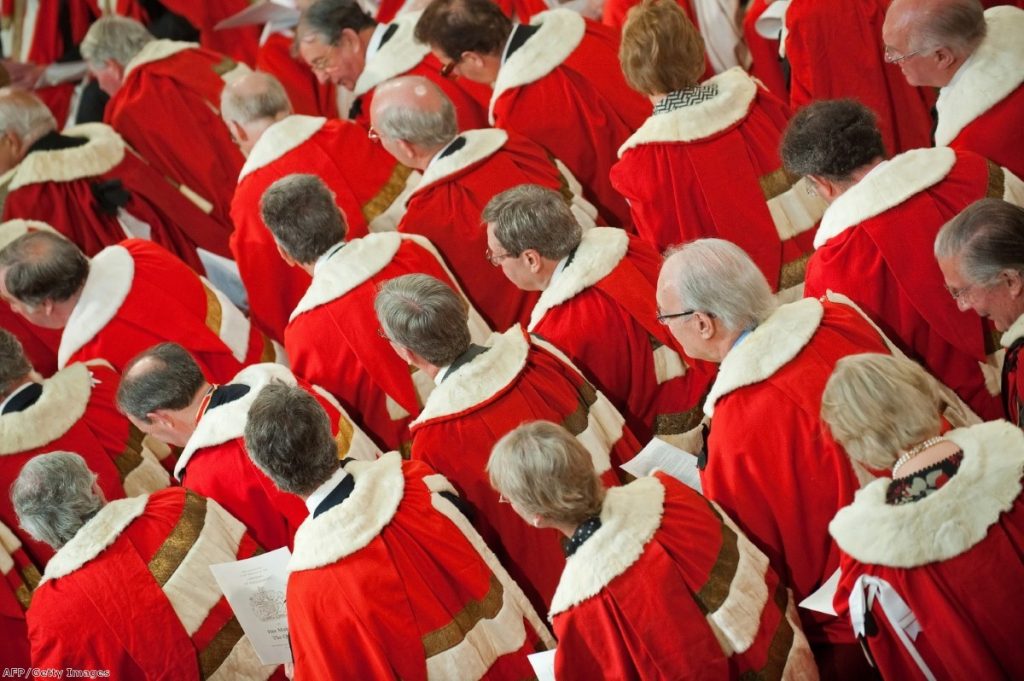Labour holds coalition hostage over Lords reform referendum
Labour is threatening to derail the coalition's Lords reform agenda if ministers do not allow a referendum on the change.
The shadow Cabinet has agreed to support the government's bill, voting in favour of the legislation at second reading, but will oppose the critical programme motion which Tory rebels plan to use to wrongfoot the coalition.
Opposition figures indicated that Labour wants to see a "lengthy debate" on plans unanimously endorsed by the Cabinet this morning to make the second chamber 80% elected.
Doing so could lead to deadlock in Westminster, crippling the government's ability to get its legislative agenda outlined in the Queen's Speech through parliament.
A spokesperson for Labour leader Ed Miliband said the central concern the opposition has about the coalition's proposals, which will be published in full tomorrow morning, is that ministers are refusing to allow the public a say on the change.
"There is little logic in a position which says we have referendums to decide whether we have city mayors, but not to decide whether to alter radically the composition and structure of our parliament," Mr Miliband wrote in a blog post.
"Yet despite these flaws in the proposed legislation, we face a clear choice: to vote down reform, or to back it. We will support reform."
Labour pointed out that the Maastricht treaty received 23 days of parliamentary scrutiny, while the Lisbon treaty was debated for 11 days.
The opposition said the amount of time initially offered by government business managers in the Commons was "unsatisfactory".
Cabinet gives green light
Downing Street said around 15 or 16 members of the Cabinet spoke in a 50-minute discussion on the controversial proposals earlier.
All offered their "strong support" for the proposed legislation, according to No 10.
"This is an important issue and an important part of the government's programme," the prime minister's spokesman said.
When asked whether there were any disagreements about the details of the proposals, he said that there had previously been discussions within the government on the issues involved.
Ministers have even had to resort to using the formal coalition committee, a dispute resolution mechanism, to address concerns about the legislation.
But Downing Street insisted the government had sought to build consensus as it developed its proposals.
"It is one of those issues where people have quite well-established views," the prime minister's spokesman added.
"When you come to the detail there can be differences of opinion."
Conservative backing for deputy prime minister Nick Clegg's package of reforms has underlined the government's determination to press ahead with the changes, despite intense hostility from some Conservative backbenchers.
Downing Street said the legislation was a government bill and would be "whipped appropriately". Ministerial aides will be forced to resign if they oppose the measures.
If necessary the government is prepared to use the Parliament Act to enforce the will of the Commons over that of the Lords.
Even with support from Tory ministers a large rebellion seems likely. Up to 100 MPs could reject the proposals when the timetable motion is put forward in the Commons before the summer recess.
It is expected that the Lords will be slashed in size from 900 to 300 MPs and that the second chamber, which could be renamed, will become 80% elected.
Concerns about the Commons' ongoing primacy will be directly addressed in clear language in the final bill, which will no longer rely purely on existing Parliament Acts to ensure the reformed second chamber cannot challenge MPs' authority.
Many Tory backbenchers are also worried by the constituency sizes which peers would be elected to, probably under proportional representation.
Ministers could allay these worries by setting the constituencies at a large regional level, perhaps adopting the same regions used for European elections. Conservative MP Oliver Heald has called for a national list to be adopted.
Much of today's political debate is taking place behind closed doors, but chief secretary to the Treasury Danny Alexander underlined all three parties' commitment to Lords reform before the 2010 general election at the Electoral Reform Society's annual conference.
"Right across the political spectrum, we all have a responsibility to deliver reform to the House of Lords – because it is what we promised," he said.
"Liberal Democrats, Conservatives, the Coalition Government. And yes, the Labour party too.
"We all collectively should feel the pressure to deliver, because it is what all political parties put in their manifestos."
Mr Alexander called on political parties to see their commitment through because it is the "right thing to do".
He downplayed the suggestion that the coalition government should not concentrate on Lords reform given the country faces more pressing matters, including the recession.
"Those who suggest that the whole of government can focus on delivering on only one thing at a time seem to forget what reforms are already in progress across our public services – at precisely the same time and maintaining our relentless efforts to ensure our economy is on the right track," Mr Alexander added.





-01.png)